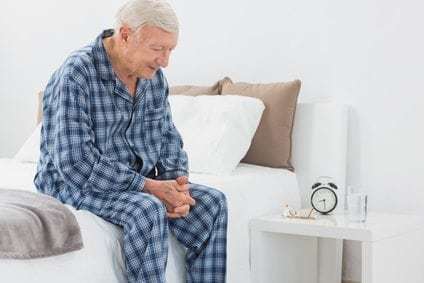Although it’s now March, many of us are still caught in the frosty grip of winter. Getting wet in the snow and slush won’t give you pneumonia, but if you already have a cold or a flu, it could develop into pneumonia due to the irritation already present in your lungs. Pneumonia can be serious at any age, but it’s especially worrisome in the very young and very old. In fact, pneumonia is the fifth leading cause of death amongst the elderly (source). To increase your awareness of this disease and help you learn about its symptoms and treatments, today we’re exploring pneumonia and the elderly.
Pneumonia and the Elderly
THE BASICS
Pneumonia is a lung infection that inflames the air sacs in one or both of the lungs, sometimes filling the air sacs with fluid or pus. It is caused by bacteria or viruses and can be caught in a variety of public places like hospitals, nursing homes, workplaces, and school. Often, pneumonia begins because your body is already fighting an illness like a cold or a flu, and it isn’t able to fend off pneumonia as well. The illness typically clears up in 2-3 weeks, however older adults may become very ill and need hospitalization. Older adults are also more susceptible to pneumonia due to the prevalence of serious diseases amongst the elderly, as well as their weakened immune systems and general frailty.
SYMPTOMS
Symptoms of pneumonia include the following:
- Fever
- Headache
- Extreme tiredness
- Coughing
- Chills
- Shortness of breath
- Chest pain
- Sore throat
- Runny or stuffy nose
- Muscle aches
These symptoms are similar to the symptoms experienced during a flu or a cold, so be sure that you don’t mistake pneumonia for a simple chest cold. Also, be on the lookout for a small cold or flu that feels suddenly worse. If you’re experiencing these symptoms, visit your doctor right away.
TREATMENT
Pneumonia must be diagnosed by a doctor. A chest X-ray and blood test are usually performed. Bacterial pneumonia is treated with antibiotics, while viral pneumonia is treated with an anti-viral medicine. Be sure to take your medicine exactly as your doctor prescribes, even if you begin to feel better. To relieve serious and uncomfortable symptoms, doctors will also sometimes give patients fluids (for dehydration), oxygen (for breathing troubles), and general pain relief. Severe cases are always treated in a hospital, but mild pneumonia can be cared for at home. Be sure to drink plenty of fluids and get lots of rest.
PREVENTION
Seniors with chronic diseases like diabetes, heart disease, or a respiratory condition have the highest risk of catching pneumonia, but all seniors should be should be concerned about it, especially during flu season (which occurs during fall and winter, typically between November and March). To prevent pneumonia, both flu and pneumonia shots are recommended for adults age 55 or older. It is also important that you stay healthy through regular exercise, a well-balanced diet, and visits to your doctor.
– – – – –
Don’t underestimate the dangerous combination of pneumonia and the elderly, and if you suspect that a loved one has contracted the illness, seek medical attention right away. This shouldn’t be difficult if your loved one lives in a retirement community, however, where it’s easy to obtain medical assistance. Speaking of which, are you looking for an assisted living facility in the Midwest? If so, be sure to check out Hearthside Senior Living Place. At each of our eight retirement communities, residents are offered transportation for medical appointments and, for your peace of mind, we also have 24-hour emergency call response. So if a resident contracts pneumonia, we are able to ensure that they quickly get the help they need. To learn more about our services and amenities, contact Hearthside Senior Living Place today.

